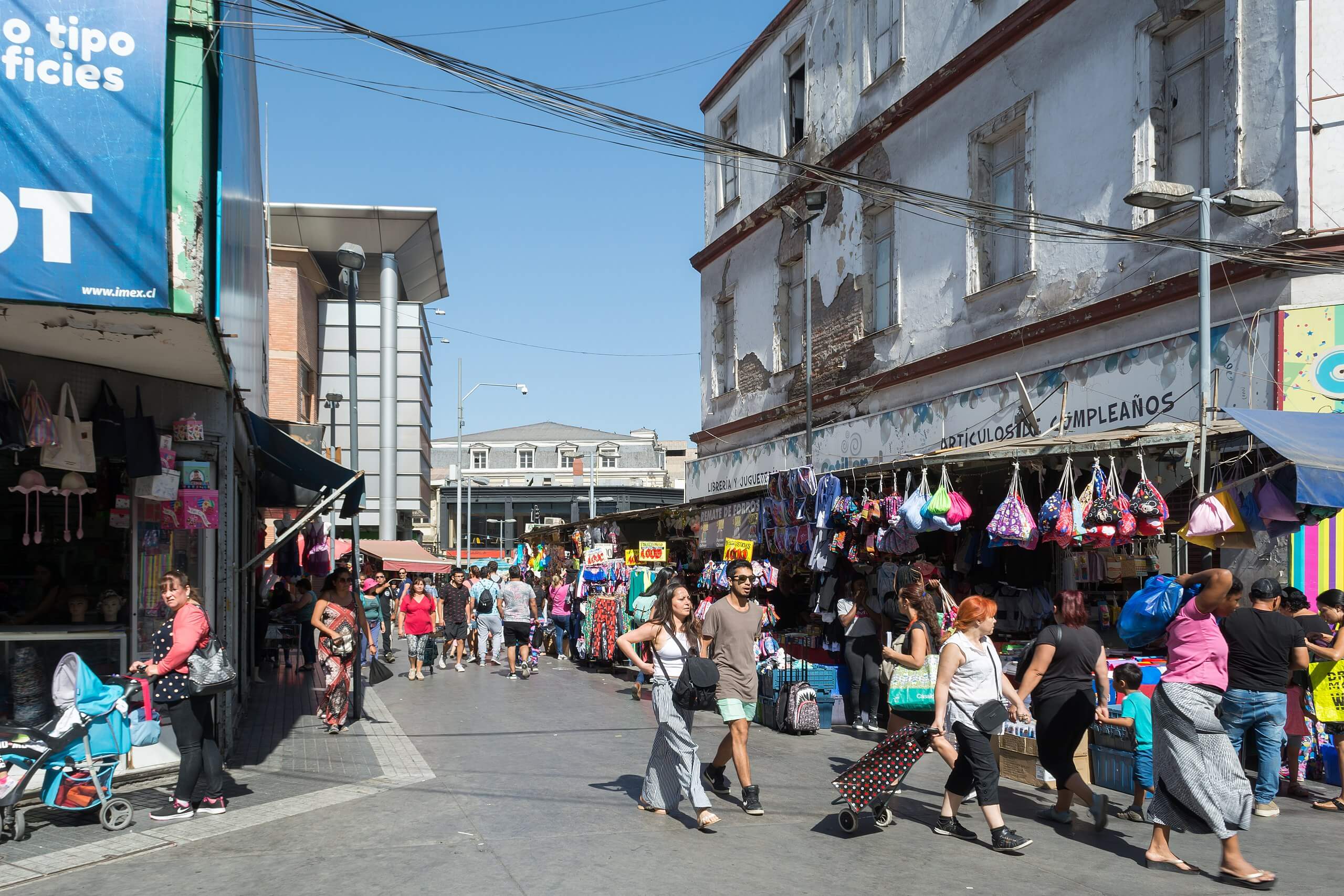Expansion of Chinese malls in Chile worries merchants
Photo: Wikimedia Commons.
According to a report by the media outlet El País, written by Maolis Castro, there is a commercial area in the capital of Chile, Santiago, featuring signs written in Mandarin, gateways with lions at the entrance, long rows of mannequins along the street, and, at the center of this location, a shopping mall with a golden dragon. This area is the city’s Chinatown, where the Chinese population in Chile is concentrated, including merchant Li Jin Long, originally from Jiangxi province.
In her article, Maolis Castro states that Jiang Xi arrived in Chile in 2007, attracted by the country’s strong economic performance at the time. The merchant mentioned that his shoe and footwear import business continues to operate and maintain a presence in the country, despite Chile no longer growing at 4.4% as it did two decades ago. During the conversation, Leticia, a Chilean employee of the merchant who assisted with translation, explained that the Chinese community is very close-knit, supports each other, and always communicates in Mandarin.
Furthermore, according to the consulting firm Collier, these shopping centers have grown by 25% annually since 2022. Currently, there are approximately 200 across the country, with at least 40% located in the metropolitan region of Santiago.
In response, the Multigremial de Chile, an association that brings together 224 small and medium-sized enterprises, expressed concern, stating that these shopping centers pose a threat to businesses that operate in accordance with Chilean law. Therefore, they requested that the Internal Revenue Service, Customs, and the Ministries of Health, Labor, and Public Works, as well as the National Consumer Service, conduct the necessary investigations into possible irregularities.
Similarly, María Teresa Vial, president of the Santiago Chamber of Commerce, believes that the growth of these shopping centers has been based on illegal and informal trade, taking advantage of spaces where the minimum legal requirements are not met.
Regarding these statements, Leticia, an employee of merchant Li Jin Long, stated that her employers are actually contributing to the Chilean economy by generating employment, complying with labor rights, and paying their taxes monthly.
For her part, Carol Chan, an anthropologist and researcher at the Millennium Initiative on the Impacts of China in Latin America and the Caribbean (ICLAC), noted that while there are reports of labor exploitation by Chinese merchants, there are also testimonies like Leticia’s, highlighting Chinese employers who are understanding, fair, and law-abiding. Chan warned against generalizing stereotypes and emphasized the need to approach this issue with caution.
However, according to Maolis Castro, these suspicions and stereotypes arose from an investigation launched in 2022 by the Prosecutor’s Office against Communist Party congresswoman Karol Cariola. In collaboration with the Investigative Police (PDI), the Prosecutor’s Office discovered conversations between the congresswoman and Santiago Mayor Irací Hassler, in which Cariola requested help to prevent the closure of a shopping center owned by Chinese businessman Bo Yang. The conversations also involved Reynaldo Morales, coordinator of Santiago’s Department of Commercial Activities. Evidence was found of the mayor pressuring Morales to prevent the expiration of Yang’s liquor licenses; however, this effort was unsuccessful, and the liquor licenses of at least 53 businesses were not renewed.
It is worth noting that the presence of these shopping centers in Chile began in the early 2000s, with the opening of the first one on Padre Alonso de Ovalle and San Diego streets, followed by another in the Meiggs neighborhood in 2010. However, during the COVID-19 pandemic, between 2020 and 2023, the presence of these Chinese businesses increased significantly, even though it had already been growing in previous years.
In this regard, Francisco Urdinez, economist and director of ICLAC, commented that these Chinese shopping centers do not represent the most significant Chinese investments in Chile. He explained that they fall within the range of 10 million dollars, a relatively small figure compared to acquisitions such as Tianqi Lithium’s purchase of 24% of SQM, valued at 4 billion dollars, or State Grid’s purchase, which is considered the most valuable Chinese asset in Chile.
Last but not least, since 2003, Chile has received Chinese investments in 50 different projects, totaling approximately 17 billion dollars. Urdinez described this trend as “a kind of boom in Chinese investments over the past four years.”
Main Source:
El imperio comercial de los chinos en Chile despierta las dudas de los gremios – El País
Related News:
Chile resumes poultry meat exports following the reopening of the Chinese market
You may be interested in:
Comercio chino se expande en el Centro Histórico desplazando a comercios tradicionales – La Prensa

